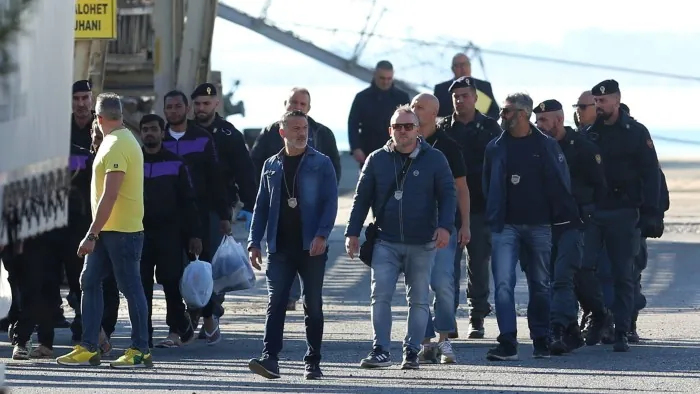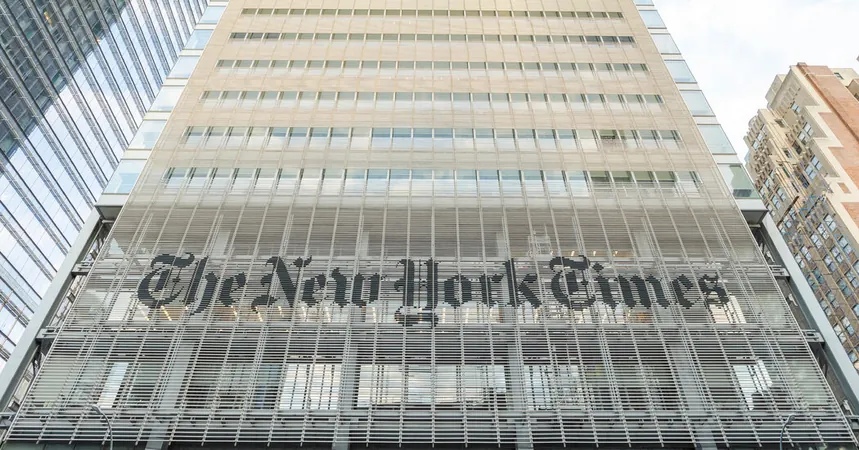
Italian Court Strikes Down Meloni's Controversial Migrant Camps in Albania Again—What This Means for Europe!
2024-11-11
Author: Wai
Italian Court Ruling on Migrant Camps
In a significant ruling, an Italian immigration judge has once again rejected Prime Minister Giorgia Meloni’s attempt to detain Europe-bound asylum seekers in Albania. This decision comes as Italy grapples with an ongoing migration crisis and has now been referred to the European Court of Justice to examine the legality of the overall initiative.
Details of the Ruling
On Friday, seven Bangladeshi and Egyptian men brought to Albania by an Italian warship were ordered to be returned to Italy, where they cannot be detained while their asylum applications are processed. The judge's ruling particularly scrutinized Meloni’s recent designation of 19 countries, including Bangladesh and Egypt, as 'safe' for quick returns, raising serious questions about compliance with EU law.
Meloni's Initiative
Meloni’s controversial initiative aimed to dissuade migrants from making perilous crossings through the Mediterranean, by suggesting they could be detained in Albania before facing rapid deportation back to their home countries. This plan has faced mounting skepticism since its initial implementation last month, when 16 migrants transported to Italian facilities in Albania had to be moved back to Italy shortly after arrival due to their vulnerable conditions.
Broader Implications for Europe
The rift between Meloni’s government and Italian judiciary over the classification of safe countries signifies broader implications for Europe at large. Prominent European leaders, including British Prime Minister Sir Keir Starmer and European Commission President Ursula von der Leyen, see Meloni’s model as a potential template for managing increasing irregular migration flows within their own nations.
Agreement with Albania
The agreement established by Meloni and Albanian Prime Minister Edi Rama last year aimed to create two holding centers capable of processing up to 3,000 irregular migrants rescued at sea. Although framed as compliant with international refugee laws, the project has been criticized, particularly regarding the selection criteria for 'safe' nations and the ethical implications of detaining vulnerable individuals.
Legal and Political Tensions
Meloni argues that national governments, not judges, should determine which countries are safe for return. However, the Italian court emphasized that EU law establishes stringent criteria for such designations and mandates judges to verify that government policies adhere to these standards.
Financial and Political Challenges
The ambitious plan envisioned by Meloni aimed to process up to 36,000 migrants annually through the Albanian centers, with an estimated cost of €800 million over five years, in an effort to alleviate the overwhelming strain on Italy’s own migrant reception facilities.
Critics of the Initiative
Critics have branded the endeavor as little more than a costly political spectacle in response to voter concerns about immigration, with many asserting that the high costs of establishing these centers serve primarily to placate Meloni’s right-wing base amid soaring migrant arrivals.
Expert Opinions
'This initiative comes with a hefty price tag for the Italian taxpayer, and many view it as more symbolic than effective,' said Daniele Albertazzi, a political expert at the University of Surrey. The ruling presents a difficult political landscape for Meloni, yet analysts believe she may leverage this setback to fuel her narrative against a perceived 'left-leaning judiciary' obstructing her governance efforts.
Future Political Narrative
'What Meloni can do now is spin this ruling into a story of political persecution, portraying herself as a victim of a system that blocks the desires of the Italian people,' added Albertazzi. As the immigration debate continues to evolve, the consequences of this legal ruling may reverberate across Europe as countries seek effective solutions to a mounting crisis.


 Brasil (PT)
Brasil (PT)
 Canada (EN)
Canada (EN)
 Chile (ES)
Chile (ES)
 España (ES)
España (ES)
 France (FR)
France (FR)
 Hong Kong (EN)
Hong Kong (EN)
 Italia (IT)
Italia (IT)
 日本 (JA)
日本 (JA)
 Magyarország (HU)
Magyarország (HU)
 Norge (NO)
Norge (NO)
 Polska (PL)
Polska (PL)
 Schweiz (DE)
Schweiz (DE)
 Singapore (EN)
Singapore (EN)
 Sverige (SV)
Sverige (SV)
 Suomi (FI)
Suomi (FI)
 Türkiye (TR)
Türkiye (TR)